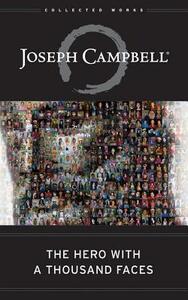Take a photo of a barcode or cover
5/5 Stars (%90/100)
This is one of the books I consider life-changing because well, it kind of did. I've always been interested in mythology and recently got more involved in archetypes, something I knew for a long time but not as archetypes. I heard Campbell's name and his book many times and I even read a couple of them. I briefly read this book before and this is why I never marked it as read. Well, now this book is one of the main sources of my thesis (which meant I had to read all of it). I absolutely loved it even though I HAD TO read it. Despite being criticized a lot, it is no surprise that Campbell and his monomyth theory managed to inspire many scholars, writers, directors and so forth. You can read this book if you are interested in mythology and want to learn more but you can also read it and use it as a reliable source like me.
This is one of the books I consider life-changing because well, it kind of did. I've always been interested in mythology and recently got more involved in archetypes, something I knew for a long time but not as archetypes. I heard Campbell's name and his book many times and I even read a couple of them. I briefly read this book before and this is why I never marked it as read. Well, now this book is one of the main sources of my thesis (which meant I had to read all of it). I absolutely loved it even though I HAD TO read it. Despite being criticized a lot, it is no surprise that Campbell and his monomyth theory managed to inspire many scholars, writers, directors and so forth. You can read this book if you are interested in mythology and want to learn more but you can also read it and use it as a reliable source like me.
Dated, but remains a must-read in terms of understanding what we really all have in common as Human Beings.
This was a ground breaking and interesting book, though he bases much on Freud's later work after rejecting the initial work he'd done with women, so I discounted the Oedipal/H. complex information, but his findings on how every religion, bar none, go back to the same monomyth are astounding and mesh quite well with what we now know about the shared origins of humanity.
Also, I must read 1001 Arabian Nights!
This was a ground breaking and interesting book, though he bases much on Freud's later work after rejecting the initial work he'd done with women, so I discounted the Oedipal/H. complex information, but his findings on how every religion, bar none, go back to the same monomyth are astounding and mesh quite well with what we now know about the shared origins of humanity.
Also, I must read 1001 Arabian Nights!
challenging
informative
inspiring
reflective
slow-paced
challenging
informative
reflective
slow-paced
Giving this book two stars instead of one just because it is an important classic in literary theory, and because the general theory it is advancing is very fascinating and relevant to discussions of story structure.
That being said, the way this book was structured was positively awful. While Campbell strikes gold on his general thesis concerning story structure, the arguments he uses for it are haphazard and eclectic. He basically states something and then just includes two or three random myths that exhibit this. Honestly, I'm rather shocked that he became as famous as he was for this book given how poorly he argued it. On account of this, this book severely disappointed me, as you really have to go to other places for evidence of Campbell's claims, given his poor job of defending them here.
This is an important work on story structure, and many of Campbell's conclusions are helpful. However, this book is not the best place to read about them, and one would be better served by reading a wikipedia article on them, or, if they want a longer work, to read Vogler's explanation of them in The Writer's Journey. This book may be a modern classic of literary theory. But its presentation and reasoning is awful.
Rating: 1.5-2 Stars (Incoherent).
That being said, the way this book was structured was positively awful. While Campbell strikes gold on his general thesis concerning story structure, the arguments he uses for it are haphazard and eclectic. He basically states something and then just includes two or three random myths that exhibit this. Honestly, I'm rather shocked that he became as famous as he was for this book given how poorly he argued it. On account of this, this book severely disappointed me, as you really have to go to other places for evidence of Campbell's claims, given his poor job of defending them here.
This is an important work on story structure, and many of Campbell's conclusions are helpful. However, this book is not the best place to read about them, and one would be better served by reading a wikipedia article on them, or, if they want a longer work, to read Vogler's explanation of them in The Writer's Journey. This book may be a modern classic of literary theory. But its presentation and reasoning is awful.
Rating: 1.5-2 Stars (Incoherent).
adventurous
challenging
funny
hopeful
informative
inspiring
mysterious
reflective
medium-paced
I was expecting a book about mythology and anthropology, and this is actually about spirituality, (probably outdated) psychoanalysis, and dreams, for some reason. Also, avoid the audiobook, the narrators speak painfully slowly and are generally quite irritating.
"Mythology has been interpreted by the modern intellect as a primitive, fumbling effort to explain the world of nature (Frazer); as a production of poetical fantasy from prehistoric times, misunderstood by succeeding ages (Müller); as a repository of allegorical instruction, to shape the individual to his group (Durkheim); as a group dream, symptomatic of archetypal urges within the depths of the human psyche (Jung); as the traditional vehicle of man’s profoundest metaphysical insights (Coomaraswamy); and awesome God’s revelation to His children (the Church). Mythology is all of these. The various judgments are determined by the viewpoints of the judges. For when scrutinized in terms not of what it is but of how it functions, of how it has served mankind in the past, of how it may serve today, mythology shows itself to be as amenable as life itself to the obsessions and requirements of the individual, the race, the age.”
challenging
informative
inspiring
reflective
medium-paced
Campbell has a wonderful way of being able to look at the many seemingly random features of mythology and find the human story beneath. Reading his comparisons of so many myths was a chance to glimpse the common stories that we all experience in our day to day lives.
Since finishing this book, I have also been pleased to see myself applying this type of thinking to science fiction and fantasy novels. It adds a wonderful layer of depth.
Since finishing this book, I have also been pleased to see myself applying this type of thinking to science fiction and fantasy novels. It adds a wonderful layer of depth.






